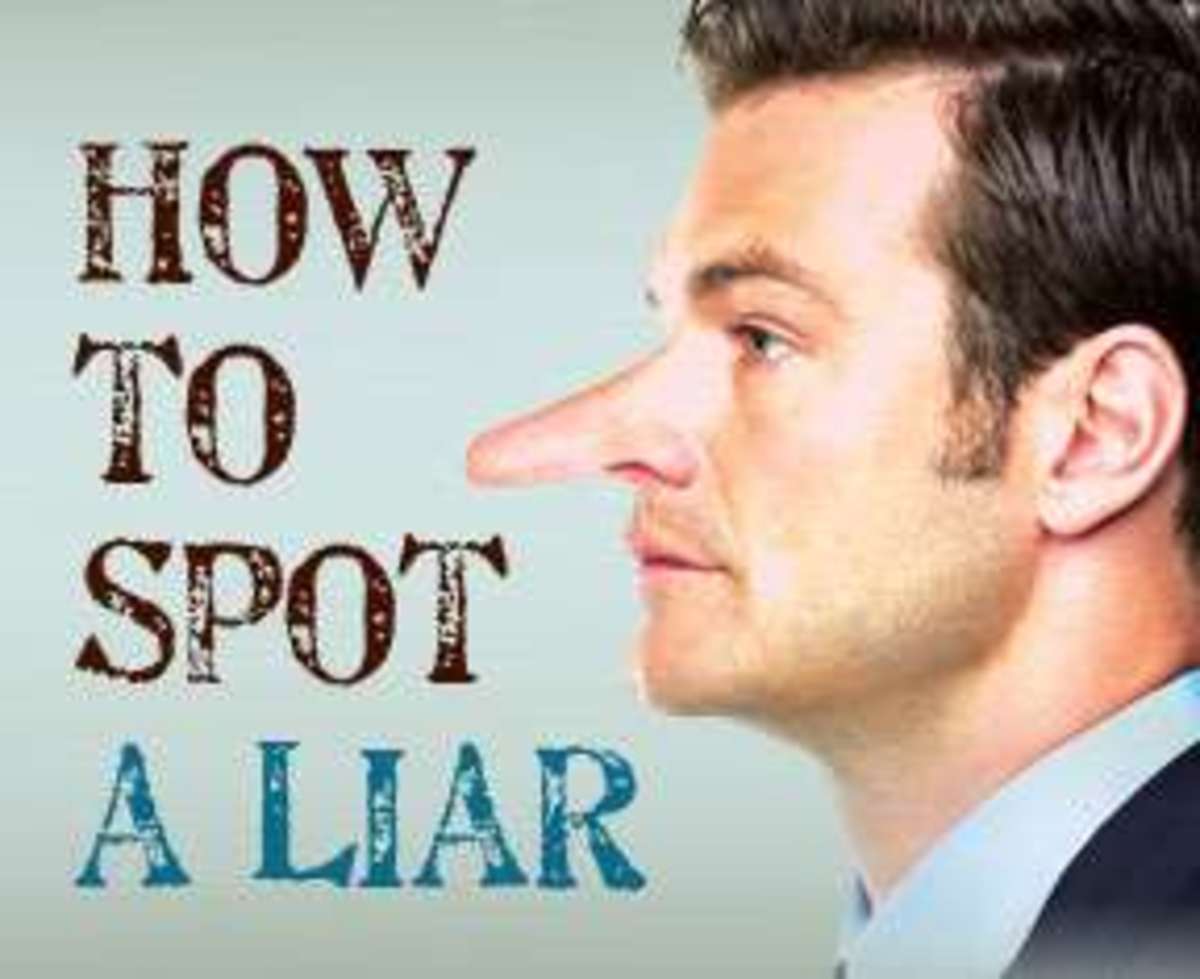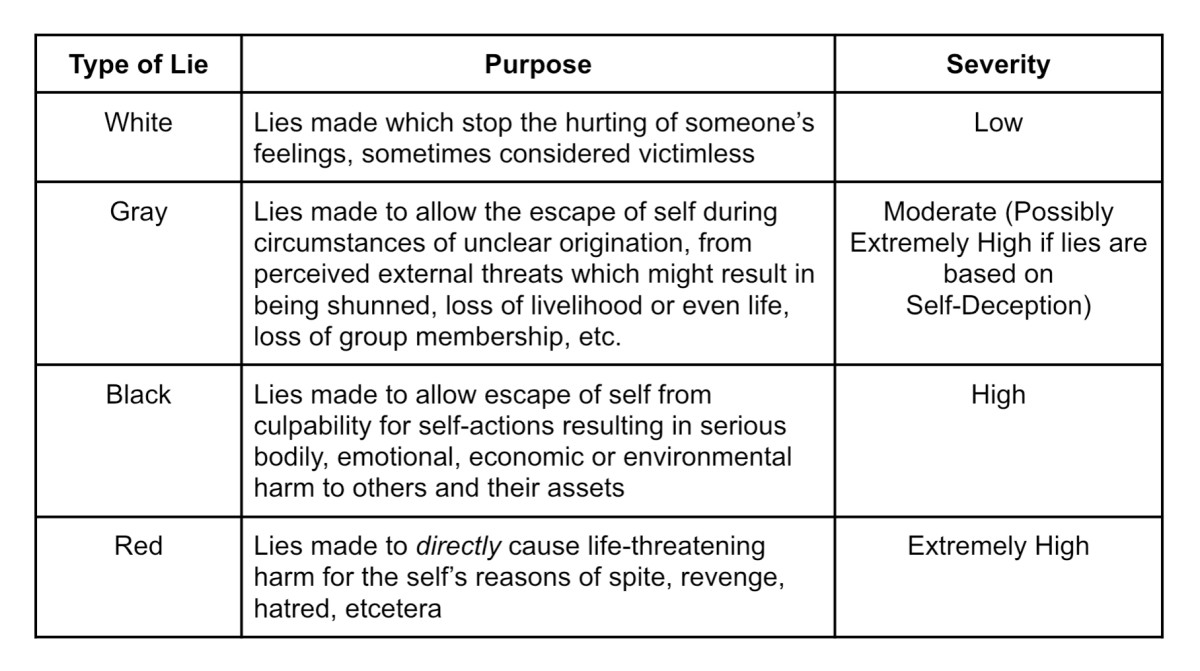The Institutionalization of Lying

Lies are nothing new
“History is a set of lies agreed upon.”-Napoleon Bonaparte
Lying in the News
- Articles: The White House and Press Create a Fairy Tale Version of History
Mendacious officials, media and our enemies have created a false storyline about the uprisings in Cairo and Libya which, among other things have resulted in the murder of an Ambassador Chris Stevens and three of his aides. - Is your doctor lying to you? New study says it's likely - HealthPop - CBS News
More than 50 percent of surveyed doctors give patients rosy prognosis, 20 percent don't tell patients they made mistake Read more by CBS News Staff on CBS News' HealthPop. - The Costs of Sanctioned Police Dishonesty | The Agitator
A really stellar opinion (PDF) from Florida Circuit Judge Joseph G. Will. The police lied to get into a woman's home. This isn't disputed. They then claim she - Oregon adjunct professor lied about military service, doctorate
University of Oregon Adjunct Professor Bill Hillar is under investigation by the Multnomah County Sheriff’s Department for fraud after some of his students at the Monterey Institute of International Studies discovered that Hillar had been lying about - US Government Officials Admit That They Lied About Actual Impact Of Wikileaks To Bolster Legal Effor
- Justices dismiss law making lying about military honors a crime - CNN
The Supreme Court on Thursday struck down a federal law making it a crime to falsely claim military medals earned.The 6-3 ruling was a free speech victory but perhaps in name only -- for a onetime
If lying isn't good, why is there so much of it?
Lying is one of those behaviors that most cultures, religions and societies have rules against. In some situations it's even considered a crime to lie to certain officials. The US government even has laws about lying to federal officials.
Although lying is considered a crime, there are some strange double standards associated with lying. Although it's a crime to lie to government officials, it is not considered a crime for the government officials to lie to you. They may not claim it's lying but instead misrepresentation or partial disclosures.
Whether the government official is a police officer, judge, federal agent, politician or bureaucrat, telling them lies often carries criminal penalties and consequences. Although those consequences apply to you, those same rules do not apply to them.
In situations where the government officials are conducting an investigation, they have no problem lying to you. If you are brought in for questioning, they may lie about what they know, or what others have told them.
They may even lie about what evidence they have in their possession. No matter how many lies they tell you, their behavior is not considered criminal or wrong, since they consider obtaining information worth any kind of moral wrong they have done in obtaining it.
When you advance up the level of government, the lies are larger. When you are being questioned about the official, they may make threats or hide things from you, but in the eyes of the judicial system, they have done nothing wrong. They consider the ‘greater good’ that they are after far outweighs any lie they may have told you along the way.
Politicians and government agencies are known for their lying. As a culture, you may have grown accustomed to accepting such lying behavior. The politicians often make many promises, both literal and implied when running for office.
Once elected, they change their official position. You may find yourself dismissing such lies as ‘politics as usual’. The reality is that lies are lies, no matter who tells them.
You may encounter lies at government agencies. Lies are often a part of policy. When you are an employee of those agencies, you are trained to follow policy and tell the public what the ‘approved’ communication is.
Even though you know it to be a lie, you may rationalize what you did as just ‘following policy’. The Nazi war criminals had the same attitude when they were on trial at Nuremburg, claiming that they were just ‘following orders’. Whether you are following orders or following policy, the lies remain. When you lie, you make someone believe something that is not true.
Government agencies which deal with secrets often tell lies in the name of ‘national security’. In their minds, protecting the security of the nation means more than violating their own conscience.
By saying that their lies are a matter of national security, you may somehow feel better about the lies or deception. This way you feel like you deserve a medal for lying, even though you know that the lie was intentionally misleading.
It is not just government officials that engage in lying as a course of business. There are many professionals that lie as a routine part of business. The legal profession is known for the many lies they tell in their course of business.
Lawyers often hide their lying behind claims that they are seeing to it that their clients receive the best defense that money can buy. It is not just the defense attorneys that lie.
There are times that prosecutors intentionally make outlandish statements, knowing that those statements are lies, all in the name of either obtaining convictions or improving their court room record. They also know that when the defendant reacts defensively or attempts countering the outlandish statement, that they look guilty.
The mindset with many in the legal profession is that any statement can be made, it is up to the other side to either prove or disprove it. When such a mindset sinks in, the lying becomes institutionalized. Lies are no longer viewed as lies, they are ‘unproven’ statements.
The public often allows the lies to continue since they are more interested in obtaining results rather than their lawyer being honest in their dealings.
Some health care professionals have also been known to lie as part of doing business. Whether it is hiding the seriousness of a health issue, or not letting the patient know everything that is going on, such actions are deceptive.
The information may be the results of a test, or examination. The test results may be kept from the patient in order to keep them from getting upset. The patient then makes choices based on lies, whether intentional or implied.
Those in the health care field often excuse their lies based on “what their lawyer told them to say” or “what is in the best interest of the hospital, practice, insurance company, etc.” Since those in the health care field are viewed as being helpers to you, the lies are often excused, based on their good intentions. You may allow them a free ride when it comes to lies, since they are there to help you or your family member.
Some big businesses and banks also engage in lying as part of doing business as well. Claims are made about their product or services that are just not true. In business, the professionals often use confusing terms that leave you believing something that is not so.
Whether it be interest rates, the promise of a new product or the effectiveness of a product, lies are often told in the form of allowing the public to believe something that they imagine.
Although the teaching profession often positions itself as being on the moral high ground, there are some instructors who routinely engage in lying. They may lie about their sources, the validity of what they are presenting or some other aspect of what they are teaching.
Although you may want to think of teachers as being right, in many cases, they are wrong, whether intentionally or unintentionally. In the cases of intentional lying, the teachers often present material that is plausible or popular rather than what is factual.
They may be pressured into this deception by the school or college where they teach, in which case, it is a matter of institutional lying. Institutions have been known to put restraints on what teachers can say and present in their classrooms.
Some teachers justify their lying based on loyalty to a political belief or popular ideology. Since they want to be liked and keep their job, it is easier to continue presenting the lies rather than to honestly deal with topics in the classroom.
There are also ethical situations when lies are considered ‘acceptable’. In those situations, a person’s life or well being may be on the line. In such cases, lying is often viewed as acceptable.
When saving lives, such as those who lied about keeping Jews in their homes during World War II, such acts are considered as type of nobility. In such cases, the principle of saving lives is viewed as more important that telling the truth.
Those telling the lies believe that they did the right thing in such situations. Although it is easy to moralize, and claim that you should always tell the truth, there are situations where higher principles need to be considered.
In addressing the topic of lying, it is also important to be honest about how institutionalized that lying has become in many societies. In the examples given above, there are many instances where lying is part of routine business. Although lying is still viewed as morally bad, there are many areas where we often turn a blind eye and allow the lies to continue without bothering to question them.
What do you really think about lying?
What professions should be allowed to lie?
Lies and being 'Authentic'
With the emphasis in society being on coming across as 'authentic' rather than telling the truth, one of the consequences is more lying. By emphasizing authenticity over truthfulness, the focus is on the person coming across as genuine.
They may genuinely believe or tell a lie, yet if they appear sincere, it's valued as 'authentic'. This shift has changed the standards which social behaviors are evaluated.
In this case, authenticity is valued more than 'the truth'. With that shift, if you lie, but do so while being authentic, it's acceptable in many parts of society.
© 2012 Jeff Murrah








